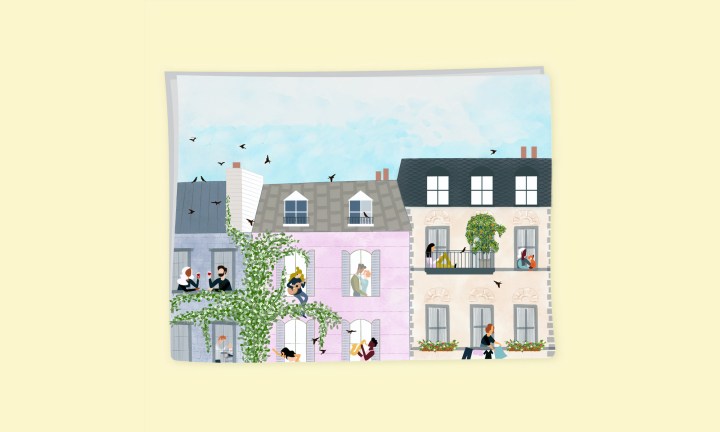DM168
Love veterans and their secrets: Are we destined to be with one person all our lives?

Toward the end of last year after having exhausted the list of sappy early 2000s Christmas rom-coms I watch religiously every festive season, I was struck by the depth of Beverly Clark’s (played by Susan Sarandon) short monologue on marriage when she suspects her husband (Richard Gere) of having an affair in the 2004 film, 'Shall We Dance', says Catherine del Monte as she explores the meaning of love.
Beverly Clark: “All these promises that we make and we break. Why is it, do you think, that people get married?”
Mr Devine: “Passion.”
Beverly Clark: “No.”
Mr Devine: “Interesting, because I would have taken you for a romantic. Why, then?”
Beverly Clark: “Because we need a witness to our lives. There are a billion people on the planet. I mean, what does any one life really mean? But in a marriage, you’re promising to care about everything. The good things, the bad things, the terrible things, the mundane things. All of it. All the time. Everyday. You’re saying, your life will not go unnoticed because I will notice it. Your life will not go unwitnessed because I will be your witness.”
Since then, the intricate dynamics of love and relationships had taken front row in my mind as I mulled over how best to unpack the abstract alchemy behind the fiddly emotion in a digestible number of words for this article. I decided that a very lowkey, Covid-conscious Christmas gathering was as good a place as any to test-drive my musings on the matter.
Several family members around the lunch table are in relationships. I study my mom (65) and dad (66), suddenly struck by the fact that they have recently celebrated 48 years together, 41 of which married.
As the pre-Level 3 lockdown merlot flows, lubricating sentimentality, memories of many an inflamed argument between my mother and father over the banality of wet bath mats, reading lights, snoring and clashing methods of toothpaste tube squeezing surfaced and I wondered about the love veterans’ ‘secrets’ to romantic relationship longevity and how the meaning of love in all its weighty forms has evolved over 48 years of ‘witnessing’ each other’s lives.
Albeit a little bewildered by the question, my father tries his hand at a response: “Well, how do you define love?” He asks. “I don’t believe there are universal laws or formulas for love. For your mother and I, it has been about sharing a common life philosophy, purpose and plan. It is about doing things together, respecting each other’s ideas and dreams and caring for each other. While it is not all moonlight and roses all of the time, it is about ‘becoming’ together. After 48 years, I still learn about your mother every single day, ” he adds.
Port Elizabeth-based retired professor, clinical psychologist and research associate with training in marital therapy and individual psychotherapy, Dr Diane Elkonin says, “Love is very difficult to define because it applies to so many different things. It applies to relationships between people, relationships between people and their activities, their children, their belief systems, supreme beings, their pets, their hobbies and so on.
“If we are specifically referring to a romantic relationship between two adults, love comes down to a combination of a number of things including trust, respect, willingness to want the best for the other person, to clearly look out for the needs of the other person, usually over and above the needs of their own,” Elkonin adds.
Psychologist and lecturer at the Nelson Mandela University, Dr Tania Lambert, weighs in: “We must understand that love relationships and love are extremely complex.
“Because it is such a complex phenomenon, you will see that if you ask various people about their perceptions of love, their answers might differ. When I personally think of love, my mind immediately goes to psychologist Robert Sternberg’s triangular theory of love. Sternberg basically said that there are three different elements of love which include intimacy (closeness and connectedness), passion (sexual desire and physical attraction) and commitment (the decision or the choice you make to stay with your partner).”
According to Sternberg, the combination of these three elements in various ways can form different ‘types’ of love. Sternberg theorised that there are seven different loves or ‘love types’. The ideal love is the consummate love type made up of all three components of love.
“The phenomenon of love is so complex and maybe to illustrate the complexity of this I must just mention a few theories relating to our experiences of love.
“These theories include biological theories and attachment theories and also love typology theories like personality theories and cultural theories and that will give you an idea that you can actually view or conceptualise love through different lenses,” says Lambert. “Because people also perceive and understand love differently, it will affect many aspects of our lives like marital satisfaction or our expectations we have towards our partner,” she adds.
“Through life’s stages, you get to a point where, if you remain in love, the care for the needs and happiness of the other person starts to supersede your own. This bond has to be nurtured by trust, shared values, shared interests and sometimes even shared children,” says Elkonin.
But how does it all begin? At what moment does one decide to ‘love’ one — or more — person sometimes for an entire lifetime?
The rules of attraction
For centuries, society has tried to explain the science behind love and the so-called “rules of attraction”. From matchmaking astrologers to pseudoscientific listicles on ‘things to do to help you find your soulmate’, what we do know, which is very astutely explained in an episode of Vox’s American 2020 television docuseries, Sex, Explained, is that chemistry has a lot to do with initial physical attraction, which acts as a springboard for a lot of love relationships.
In a moment of attraction, the hormone flood gates in the brain burst open, manifesting physical feelings like a rise in body temperature, tingles, jelly-legs and heart palpitations.
According to Dr Helen Fisher and her team at Rutgers School of Arts and Sciences, attraction can be broken down into three categories based on the type of hormones the brain releases from the hormone secretion regulator known as the hypothalamus at each stage in the process of attraction.
These stages include lust, attraction and attachment. Lust’s hormones are testosterone and estrogen. Attraction’s hormones are the fight or flight hormones like dopamine, norepinephrine, adrenaline and serotonin. Attachment’s hormones are oxytocin and vasopressin.
During the attachment phase of attraction which is closely linked to the “honeymoon-stage” (the initial 12 to 24 months of a relationship) phenomenon when every moment together is thrilling and frantic, dopamine is the hormone that gives you the same ‘reward’ feeling when fulfilling cravings like eating sugar or the high one gets from a drug. A dump of this hormone together with norepinephrine and adrenaline can manifest feelings of nervousness and excitement making it hard to do everyday things like eating and sleeping.
However, in the same short Vox documentary, Professor of Social Psychology and attraction expert, Viren Swami says, “The idea that we are simply animals that only care about reproducing is reductive. It is not simply a biological drive to produce offspring.
“The point more generally is, to have a relationship, to form a relationship with an individual or even just to have sex with an individual requires so much more than just biology,” adds Swami.
Elkonin continues, “Purely because of biological procreation, there is a very physical aspect to the beginning phases of love which is fluid and changes as the development of the person changes. The relationship then grows and transitions into more of a friendship, trust, respect-relationship, away from that passion and urgency of the first years of (being together).”
The seven-year itch
Feminist author, certified sexologist, and sex educator, Gigi Engle and Belgian psychotherapist Esther Perel in their respective books All the F*cking Mistakes: A Guide to Sex, Love, and Life, and Mating in Captivity touch on a relationship phenomenon known as the “seven-year itch”. While there is no bell that goes off at exactly 61,320 hours, the so-called “honeymoon phase” fades, the butterflies fly away and as couples begin to navigate life’s very unsexy responsibilities like work, children, finances etcetera, etcetera, a state of “relationship stagnation” can, and often does set in.
“We talk about the ‘seven-year itch’ when a romantic relationship reaches the point where there are no more secrets in the relationship, no more ‘mystery’. You’ve become used to the relationship or bored with it or the relationship has become too mundane, and this is the stage where couples start fighting and arguing.
“Perhaps they even start looking around to see if there is something more interesting out there that will attract them. That will come down to the personal characteristics of the person and perhaps they feel that the (relationship) is just something they can give up on, or they say that they have invested … time, money, children, family and decide to work it out with the partner,” says Elkonin.
“People can and do grow apart. From a therapeutic point of view, I have counselled couples where I’ve said: ‘listen, guys, this isn’t difficult, you can work through this and work it out.’ But then I have counselled others and said, ‘for god’s sake, head for the hills!’ There is no guarantee that if you do X, Y and Z the relationship will last,” she says.
Lambert highlights four factors that are predictors of dissatisfaction and consequently, kryptonite for romantic relationship longevity.
“Criticism — this refers to personal attacks on the partner; when your partner becomes defensive in reaction to this. Research indicates that contempt is a predictor of relationship dissatisfaction — for example when you treat your partner with disrespect, you’re sarcastic with your partner, you ridicule your partner … and what often happens … your partner can withdraw, and this withdrawal is the fourth indicator of relationship dissatisfaction.
“These four predictors of relationship dissatisfaction have formed the basis of many relationship enhancement programmes which focus on changing patterns of interactions and communication to avoid being that critical all the time; or how do I actually prevent myself from becoming withdrawn in the relationship,” says Lambert.
Monogamy vs polyamory
Marriage and long-lasting relationships are not mutually exclusive. Given the seven-year itch phenomenon, one cannot help but question whether monogamy is just another archaic construct used to enforce gender roles and social order or if we are indeed destined to be with one person ‘till kingdom come’?
“Given the different generational set, we are noticing that relationships don’t last as well, or with so much longevity presently simply because it is so much easier to get out of them.
“When you think of our parent’s generation it was unheard of. If you no longer loved (your partner) or they annoyed you, you stuck it out because you had no other option.
“I was listening to some 40-year-olds the other day, lamenting about how they were all married at 30 and hitting what is called ‘the second stage’ when many of those marriages are dissolving and new ones are starting,” recounts Elkonin.
According to the Statistics South Africa’s Marriages and Divorces 2016 report, the number of civil marriages in 2016 sat at 139,512; 25,326 of those marriages ended in divorce. The report also found that four out of 10 marriages end in divorce before their tenth anniversary.
In 2018, Vox’s Monogamy Explained touched on the arguably ‘out-dated’ idea of monogamy. The episode declares that monogamy and love are not mutually exclusive. American relationship columnist Dan Savage, who is featured in the episode, notes that “love is a feeling and monogamy is a rule”.
“Affairs do happen and they can sometimes continue and a relationship will quite happily continue with it. It depends on, firstly, whether it [the affair] is revealed and then how the partner is going to accept it. But very often we find that specific people meet certain needs that we have that aren’t necessarily met in a love relationship.
“It is a dangerous road to follow but we can love people outside of our ‘exclusive’ relationship and somebody who you might be sexually involved with without actually jeopardising said exclusive relationship; it just depends on how open the relationship is. So there are certainly times where people will be tempted,” says Elkonin.
The era of digital dating
There is no doubt that the advent of technology has changed our perception of love and what it means to be in a relationship. And since the advent of the Covid pandemic, platforms from Tinder, to Bumble, to Grinder have seen more people using their apps. Whether the reasons for the increase in online dating is for fear of being alone ‘if the world is coming to an end’, or to fill the growing social interaction gap, Lambert explains how and why technology has re-landscaped the dating industry.
“If you think of things like self-presentation within the virtual space, you notice that people have a lot of control over how they would like to present themselves on various online platforms. These online platforms often also create a false sense of the ‘perfect relationship’ and the ‘perfect couple’ and depending on which platform you use, you will get different cues or information which gives you suggestions of how the perfect relationship looks or should look like.
People will scroll through posts of other people in relationships and subsequently modify their expectations and ideas of love based on one post which can, unfortunately, lead to unrealistic expectations. In this sense, the influence of social media and the various social platforms on our idea of relationships is rampant,” says Dr Lambert.
When the phenomenon of online dating first came onto the scene, it was largely viewed in a negative light, due to the amount of deception stemming from bogus profiles and it being only good for ‘hooking up’.
However, according to Lambert, the popularity of online dating has increased immensely and is now a prominent avenue for finding life-long, romantic partners.
“In some of the research I have done, participants will report that online relationships can be highly satisfying and highly rewarding and participants have reported that online relationships can be more intimate than face-to-face relationships,” says Lambert.
“In terms of the development of online relationships, it is important to note that many people who engage in online relationships report that intimacy — that closeness and connectedness — develops much faster online than in a face-to-face relationship. The intimacy they experience online is much higher.
“This is due to the anonymous nature of online platforms leading people to share much more about themselves much faster. With this higher rate of self-disclosure and the quality of that self-disclosure, higher levels of intimacy are promoted. One of the ways in which you develop intimacy is specifically through self-disclosure,” adds Lambert.
“Relationships last for all sorts of reasons and a lot of it is tolerance, respect, care and acceptance. A lot of it is give and take. Giving the other person the freedom to do the crazy things they want to do and accept that that is part of who they are,” adds Elkonin.
For Johannesburg-based love veterans, Laki Vogiatzis and Robin Parfitt, le coup de foudre struck 35 years ago. “The attraction was not only physical and chemistry transcended that initial charm to the recognition of a kindred soul. Conversation was easy and we were comfortable in one another’s company,” say Laki and Rob. “That feeling, emotion, phenomenon (call it what you want) of ‘love’ for us, meant feeling at ‘home’ with one another.”
Laki and Rob got married in 2008, two years after same-sex marriage was made legal under the Civil Union Act in South Africa.
“The years have sped by. Despite having been together for 35 years, we got married just a little over a decade ago because marriage was not initially legal and when it became legal we felt that we owed it to those who had fought to legalise marriages,” say Laki and Rob. “For us, it (marriage) was a statement of being proud to be married to the person we love,” they add.
Laki and Rob say their ‘secret’ to keeping a relationship like theirs alive for so long, once again, boils down to respect.
“Never call each other names (sarcasm for example) and don’t be curt with one another. A sense of humour is essential — always laugh at the smallest things and find the best in everything. Finding an interest in everything we see and discussing it even if there is a robust discussion,” Laki and Rob reflect.
On what has arguably been one of the biggest relationship tests of the decade, the Covid lockdown, Laki and Rob say: “Love in the time of Covid means being together and not ever feeling cramped, being comfortable together, being in tune with one another and being at ease in each other’s company.”
“Love is being able to say, when getting into bed at night, how blessed we are to be spending this time together and for us, this is the best part of the day,” they say. DM/ ML

















 Become an Insider
Become an Insider
Comments - Please login in order to comment.